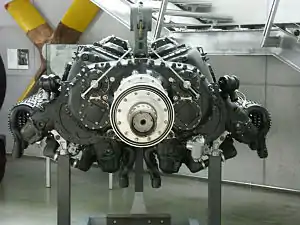| Ha-70 | |
|---|---|
 | |
| DB 610 gearbox end, showing same two-engine arrangement | |
| Type | Piston X 2 inverted V12 aircraft engines |
| National origin | Japan |
| Manufacturer | Aichi Kokuki |
| First run | 1945 |
| Major applications | Yokosuka R2Y |
| Developed from | Aichi Atsuta |
The Aichi Ha-70 was a compound engine composed of two 1,700 hp 12-cylinder liquid-cooled inverted V-12 Aichi Atsuta aircraft engines mounted to a common gearbox. The only aircraft powered by the Ha-70 was the Yokosuka R2Y, an Imperial Japanese Navy Air Service (IJNAS) prototype reconnaissance aircraft that was designed and built near the end of World War II.
Design and development
In common with Daimler-Benz, Aichi Kokuki KK joined two Aichi Atsuta engines to drive a single propeller through a combining gearbox in very similar fashion to the Daimler Benz DB 606 (two Daimler-Benz DB 601 engines coupled to a gearbox),
The Yokosuka R2Y prototype reconnaissance aircraft required a new engine of 3,400 hp (2,535 kW) and after studying the Daimler-Benz DB 606A-2 engine that powered the Heinkel He 119 single-engine reconnaissance bomber, Aichi determined that the required horsepower could be attained by coupling two Atsuta engines with a common gearbox. To obtain the required power the Atsuta would require up-rating by at least 300 hp (224 kW) horsepower; Aichi continued to improve the Atsuta 32, eventually extracting the required 1,700 hp (1,268 kW)
The two inverted Vee Atsuta engines were mounted side-by-side, each rotated outboard from the centre-line so that the inner banks were upright, with sufficient room between them for the exhaust manifolds. The engines were attached to a gearbox that combined the two separate engine drives into a single output shaft.[1]
Application
Fitted to the R2Y the Ha-70 was mounted behind the pilot, requiring a long drive shaft to drive the nose-mounted gear box that mounted the six-bladed propeller.
Specifications
Data from The First Naval Technical Arsenal, August 22, 1945[2]
General characteristics
- Type: Two coupled twelve-cylinder liquid-cooled supercharged 60° inverted Vee aircraft piston engines
- Bore: 150 mm (5.91 in)
- Stroke: 160 mm (6.30 in)
- Displacement: 33.93 L (2,070.5 in³) each, 67.86 L (4141 in³) total
Components
- Valvetrain: Two intake and two sodium-cooled exhaust valves per cylinder actuated via a single overhead camshaft per cylinder block.
- Supercharger: Gear-driven single-speed centrifugal type supercharger[3]
- Fuel system: Direct fuel injection
- Oil system: Dry sump with one pressure and two scavenge pumps
- Cooling system: Liquid-cooled
Performance
- Power output: Takeoff: 2,500 kW (3,350 horsepower)
See also
Comparable engines
Related lists
References
Notes
- ↑ Daimler-Benz DB 606
- ↑ The First Naval Technical Arsenal, August 22, 1945
- ↑ Wilkinson, Stephan (Jan 2003). "With the Noise of a Stone Crusher". Popular Science: 28.
Bibliography
- Monogram Close-Up 13 ISBN 0-914144-13-8
- R. J. Francillon, Japanese Aircraft of the Pacific War (1970 Putnam & Company) SBN 370 00033 1
External links
- Wilkinson, Stephan (Jan 2003) 'With the Noise of a Stone Crusher', Popular Science
- NASM 'Aichi M6A1'